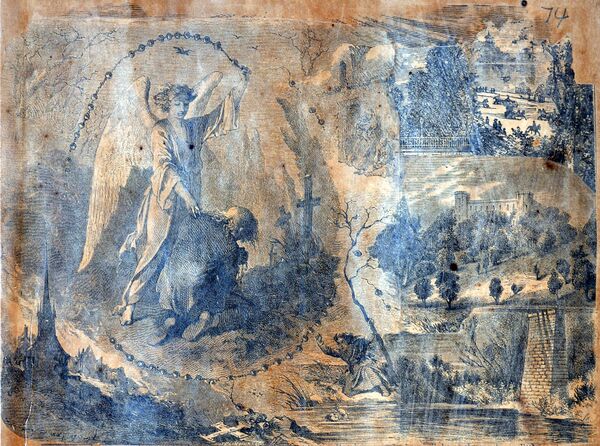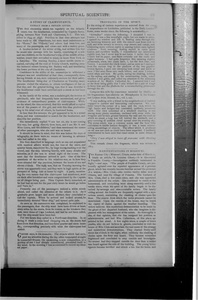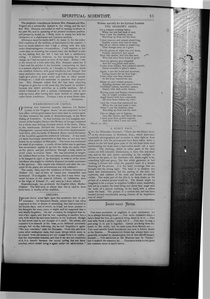< A Story of Clairvoyance (continued from page 3-148) >
prospect of being safe at home by night. A party, mentioning the very names that this clairvoyant had mentioned, went on deck after breakfast and were congratulated by the Captain on all danger being past. Then Captain Berry remarked, as he had had no rest for the past sixty hours he would go below and “turn in.”
Presently one of the passengers noticed a white streak ahead, and called the attention of the others to it. As it gradually grew larger and more distinct, they concluded to call the captain. When he arrived and looked around, he immediately shouted “Bout ship,” and turned quite pale.
As soon as the manoeuvre was completed, he explained to the passengers, that the ship must have been driven at least, sixty miles by the storm, from its course, as the breakers they saw, were those of Cape Lookout, and had he not been called, that the ship would have been lost.
For two hours they sailed in a North-east direction. In so doing, it made a cross head chopping sea, as the storm had been from that direction, and lost three quarter and stern boats &c., corresponding precisely with what the clairvoyant had stated.
<Untitled> (Goethe says, in his memoirs)
Goethe says, in his memoirs: The objects which had occupied my attention during the day often reappeared at night in connected dreams. On awakening, a new composition, or a portion of one I had already commenced, presented itself to my mind. In the morning I was accustomed to record my ideas on paper.
Knaresborough Castle
On looking over historical records, observes Sir Bulwer Lytton, in his “Eugene Aram,” we are surprised to find how often certain great names have been fatal to certain spots. He then instances the castle of Knaresborough, in the West Riding of Yorkshire. In that fortress, the four knightly murderers of the haughty Becket (the Wolsey of his age,) remained for a whole year, defying the weak justice of the times. There, to, the unfortunate Richard the Second—the Stuart of the Plantagenets—passed some portion of his hitter imprisonment. And there, after the battle of Marston Moor, waved the banner of the Loyalists against the soldiers of Lilburne. It was made yet more touchingly memorable at that time, as you may have heard, by an instance of filial piety. The town was straitened for want of provisions: a youth, whose father was in garrison, was accustomed nightly to go into the deep, dry moat, climb up the glacis, and put provisions through a hole, where he stood ready to receive them. He was perceived at length; the soldiers fired on him. He was taken prisoner, and sentenced to be hanged in sight of the beseiged, in order to strike terror into those who might be similarly disposed to render assistance to the garrison. (His respite was obtained; and after the conquest of the place, the adventurous son was released.)
The castle, then, once the residence of Pierce Gaveston of Hubert III., and of John of Gaunt, was dismantled and destroyed. It is singular, by the way, that it was twice captured by men of the name of Lilburn, or Lilleburne, once in the reign of Edward II., and once as I have related.
Knaresborough, too, produced the English Sibyl, Mother Shipton. The wild rock, at whose foot she is said to have been born, is worthy of the tradition.
Dreams
Dreams throw some light upon this wondrons fact of preexistence. Sir Benjamin Brodie relates that it has often happened to him to dream of something that had occurred in his boyish days, and of which, as it had not been present to his thoughts for many years, it might well be supposed that it was wholly forgotten. On one occasion, he imagined that he was a boy again, and that he was repeating to another boy a tale, with which he had been familiar in his boyhood, though he had never read it, nor thought of it since. He awoke, and repeated it to himself at the time, as he believed accurately enough, bnt on the following day he had forgotton it again. “We may conclude,” adds Sir Benjamin, “from this and from some other analogous facts, that many things which seem to be erased from our memory are not erased from it in reality; that the impression remains, and that if we are not conscious of it, it is merely because the secret spring has not been touched, which would bring it again under our observation.”
Editor's notes
- ↑ image by unknown author
- ↑ Goethe says, in his memoirs by unknown author, Spiritual Scientist, v. 2, No. 3, March 25, 1875, p. 33
- ↑ Knaresborough Castle by unknown author, Spiritual Scientist, v. 2, No. 2, March 18, 1875, p. 15
- ↑ Dreams by unknown author, Spiritual Scientist, v. 2, No. 2, March 18, 1875, p. 15



